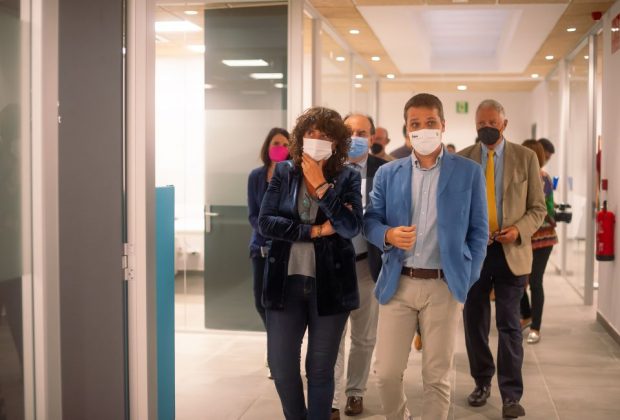The minister Teresa Jordà visited the new BETA TC
Jordà highlighted the crucial role played by a territorial university like UVic-UCC in the revalorisation of natural resources

The minister of Climate Action, Food and Rural Agenda of the Government of Catalonia, Teresa Jordà, visited the new facilities of the BETA Technology Center at the University of Vic-Central University of Catalonia (UVic-UCC) this afternoon. She was accompanied by the rector of the university, Josep Eladi Baños, and the director of the BETA Technological Center, Sergio Ponsá, and was able to see the centre’s new space and research project for herself.
At the end of her visit to the facilities, the minister Jordà stressed that the Ministry she heads was already aware of the work that CT BETA is doing in the areas of biodiversity and biotechnology. “We talk a lot about a circular bioeconomy, which is a very old concept, but we are returning to it today because we are forced to due to the climate emergency we are experiencing, and because all companies’ policies must focus on seeking sustainability,” said the minister.
Jordà highlighted the crucial role played by a territorial university like UVic-UCC in the revalorisation of natural resources, which is a task that cannot be carried out if there is no technology behind it. “We will carry out this mission based on co-governance, research, innovation, with companies, with the Administration, with the rural world and with territorial cohesion,” she emphasised. Jordan concluded by saying: “this centre must be a benchmark, and we will fight for the BETA Technological Center to have the position it deserves for the benefit of the country.”
Territorial links
The rector of UVic-UCC, Josep Eladi Baños, highlighted the CT BETA’s expertise in the sphere of the circular bioeconomy “for reusing waste to the maximum extent possible, and so that we make a more sustainable city and Catalonia.” He thanked the minister for her visit “to a centre to which this university is strongly committed”. Baños also mentioned the recognition that the CT BETA has received from Catalan companies, given that “the links with the territory are very important”.
Others joining the visit were Isaac Peraire, director of the Catalan Waste Agency, and Arnau Queralt, director of the Advisory Council for Sustainable Development of Catalonia. On behalf of UVic-UCC, the visitors were the general manager of FUBalmes, Joan Turró; the vice-rector for Research and Knowledge Transfer, Jordi Collet; the manager, Marc Mussons; the Corporate Policy coordinator, Meritxell Borràs; and the deputy director of the BETA Technological Center, Laia Llenas.
The CT BETA works to contribute to the technological development of society, fostering the transition to the circular bioeconomy in rural areas, and helping to balance their relationship with the urban world. This centre aims to be a key player in achieving the European and global sustainable development goals in its territory, in line with the interests of the Ministry of Climate Action, Food and Rural Agenda of the Government of Catalonia. The research carried out at CT BETA, which is channelled through various European projects, aims to respond to the current needs of companies and government agencies.
More than 1,200 m² of built area
The CT BETA moved to the Can Baumann facilities, next to the UVic-UCC Faculty of Medicine in early 2021, although the official inauguration took place last July. The research centre occupies two central buildings in the old fur factory, and covers a total built area of 1,260.80 m². The CT BETA’s move to this area in the city of Vic is the first part of the FuturLab project – the UVic-UCC Science and Technology Park that will be located in the complex.
The new facility is divided into two different main working areas. One of them is given over to offices, work spaces for researchers, UCoworking areas, spaces for technicians, informal meeting rooms, etc. The other area is intended exclusively for the technology centre’s laboratories. These are the laboratories where the CT BETA has experienced the most significant qualitative leap, which is essential to be able to continue evolving.
The new facilities have specific laboratories for the various lines of work: the Ecology laboratory, the bioprocesses laboratory and the pilot plant areas, where various environmental technologies for waste valorisation can be scaled and evaluated. The current laboratories mean that the CT BETA can work at various scales of technological development. Finally, there are the new analysis laboratories, which give BETA highly competitive analytical capabilities for characterising liquid and solid samples as well as gaseous emissions.
